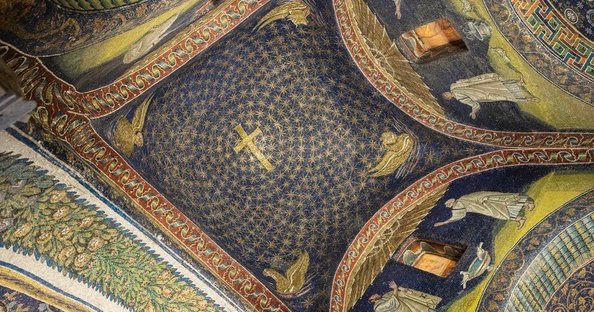The nature of Europe

The figure in her analysis who most gripped my imagination is Theoderic the Great. In the 480s this Gothic king led his people from north of the Danube to occupy Ravenna. It is a city on the Adriatic just south of Venice (which did not yet exist). From there he ruled all of Italy and Sicily, southern France, Spain and part of the Balkans. But he did so in the name of the emperor in Constantinople; the then capital of the Roman Empire where he had been trained and educated as a hostage.
For thirty years, Theoderic refreshed imperial administration while settling his Gothic followers and legislating for mutual toleration. An Arian Christian, he triggered a competing celebration of power and belief in the golden mosaics of Ravenna’s churches and palaces.
Another chapter in Ravenna is dedicated to a man, possibly a monk, known as the ‘Anonymous Cosmographer’. Working in what he described as the “most noble Ravenna”, he mapped the whole Mediterranean world and its outer regions – including “Britannia, which is in Europe”. That was in the late seventh century. He was a product of both Gothic and Greek influence, whose place names he knew, while writing in Latin.
Later, after 800 when Charlemagne was crowned emperor in Rome, he went straight to Ravenna to take its marble and its statue of Theoderic with him as he headed back to Aachen (in north Germany).
Judith Herrin argues that Charlemagne, a Frank, saw in Ravenna a purpose-built Christian capital to inspire his own, while on the walls of San Vitale he witnessed the famous mosaic of the Eastern Emperor Justinian, setting out the image of how imperial power should present itself.
Her history is carefully pieced together and free of my sweeping claims about the present. Nor is the picture she draws a peaceful one. But she sets out how, thanks to the overarching influence of what we now call Byzantium, when Ostrogoths, Visigoths, Vandals, Franks and Lombards replaced the Roman Empire with their own energetic cultures they created a Latin Christendom that always combined different languages and cultures with shared belief in authority.
If this is the tap root of our present continent, then the five days it took the leaders of the EU member states to agree to the new bonds was not an inefficient waste of time but a confirmation of Europe at its best. Always frustrating but always worth belonging to.
tinyurlis.gdclck.ruulvis.netshrtco.de
